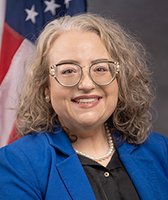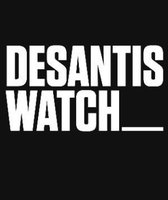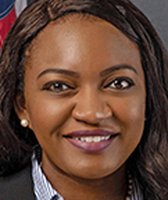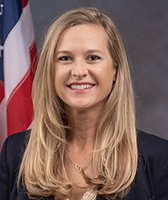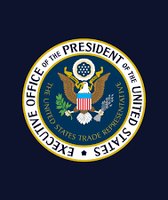Stand up for the facts!
Our only agenda is to publish the truth so you can be an informed participant in democracy.
We need your help.
I would like to contribute
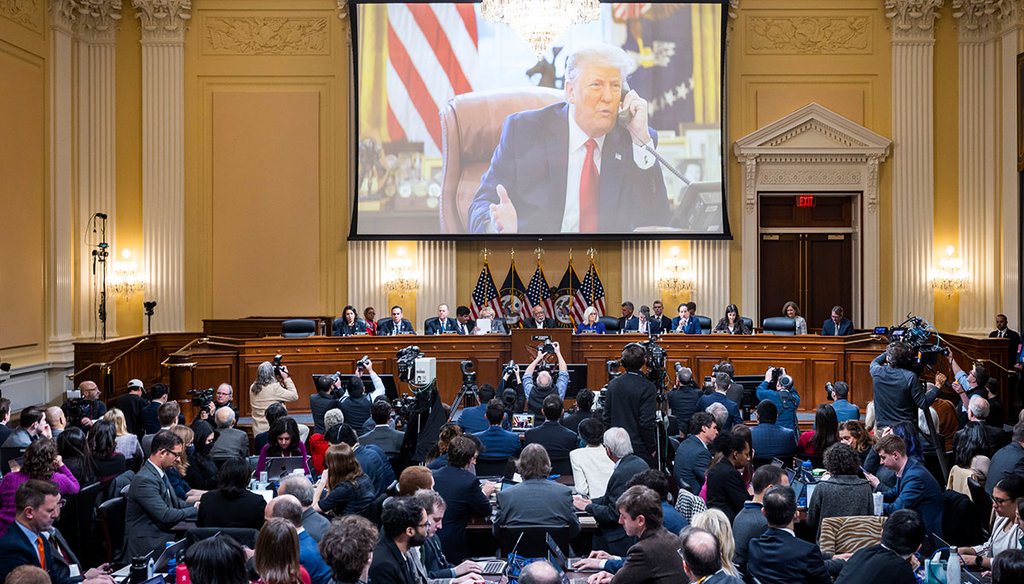
A video presentation shows former President Donald Trump as the House select committee investigating the Jan. 6, 2021, attack on the U.S. Capitol holds its final meeting on Dec. 19, 2022, on Capitol Hill in Washington. (AP)
In a historic move by a congressional committee against a former president, the House select committee investigating the Jan. 6, 2021, attack on the U.S. Capitol voted Dec. 19 to refer four criminal charges against Donald Trump to the Justice Department.
The charges against Trump, unanimously approved by the nine-member committee, were inciting or assisting an insurrection; obstructing an official proceeding; making false statements to a federal official; and conspiracy to defraud the government.
The committee also referred four Republican members of Congress, including House Minority Leader Kevin McCarthy, for investigation by the House Ethics Committee for failing to obey legal subpoenas issued by the committee.
Although the language in the committee's criminal referrals for Trump was crisp and clear, its words for his top aides were less precise. The committee noted there was "sufficient evidence" for criminal referrals for Trump lawyers John Eastman, Kenneth Chesebro and Rudy Giuliani, as well as Trump's chief of staff Mark Meadows, but said, "This committee does not attempt to determine all of the participants of the conspiracy."
The criminal referrals follow an 18-month investigation into the Jan. 6, 2021, attack, which included interviews with more than 1,000 witnesses to provide the public with glimpses of what led to the violence that erupted that day. Nine previous televised hearings outlined the actions of the former president and some of his former aides.
Sign up for PolitiFact texts
In October, the committee subpoenaed Trump, but he's so far fought the order. Trump has sought repeatedly to discredit the committee, calling its investigation a "partisan witch hunt." A Trump spokesman in recent days has also likened the committee to a "kangaroo court."
In August, former Vice President Mike Pence said he'd consider testifying before the committee, but he later changed his mind.
These recommendations by the committee, which consists of seven Democrats and two Republicans, neither hold legal weight nor require the Justice Department to file charges. The committee's power expires when the new Congress convenes Jan. 3.
"We have every confidence that the work of this committee will help provide a road map to justice and that the agencies and institutions responsible for ensuring justice under the law will use the information we provided to aid in their work," committee Chair Bennie Thompson, D-Miss., said at the Dec. 19 hearing.
The meeting preceded Dec. 21's planned release of an 800-plus-page report encapsulating the committee's findings. Here's what PolitiFact knows about the select committee's criminal referrals against Trump — and what happens next.
The Justice Department declined PolitiFact's request for comment.
What the criminal referrals said
Reflecting on the hundreds of rioters who pleaded or were found guilty for their actions on Jan. 6, 2021, Rep. Jamie Raskin, D-Md., said the select committee was compelled to move against the former president.
"Ours is not a system of justice, where foot soldiers go to jail, and the masterminds and ringleaders get a free pass," Raskin said.
For the first criminal offense, the committee invoked 18 USC 1512, which makes it unlawful to obstruct, influence or impede any official proceeding. According to federal guidelines, the offense carries a maximum sentence of 20 years.
The committee argued in an executive summary that Congress' Joint Session to certify the result of the 2020 presidential election should be considered an "official proceeding" under that section of the criminal code. It cited a number of federal court cases.
"Based on the evidence developed, President Trump was attempting to prevent or delay the counting of lawful certified Electoral College votes from multiple States," a summary of the committee's report read. Trump was "personally involved in this effort."
The committee referenced both Trump's public pressure on Pence to curtail the certification of the election, and a plan to create and submit fraudulent electoral slates.
The second criminal offense against Trump, Eastman and others is centered on 18 USC 371, or a conspiracy to commit offense or defraud the U.S. government. The maximum prison sentence recommended by federal guidelines is five years.
According to the executive summary, the select committee found evidence that Trump and Eastman entered into a "formal or informal agreement" to participate in a multipart plan to "obstruct a lawful certification of the election."
The committee also noted that Jeffrey Clark, a former Justice Department lawyer, stood out as a participant in the conspiracy, adding that evidence suggests he entered into an agreement with Trump to send a letter to state officials about appointing new electors if appointed acting attorney general.
"There were numerous overt acts in furtherance of the agreement, including each of the parts of the President's effort to overturn the election," the committee wrote. "These included, but certainly were not limited to, direct pleas to the Vice President to reject electors or delay certification, including in Oval Office meetings."
Third, the select committee said Trump violated 18 USC 1001 by conspiring to submit "slates of fake electors to Congress and the National Archives." The charge carries a maximum sentence of five years.
The Justice Department outlines three requirements for a false statement to fall under that section of the criminal code: the act or statement must be material; done within the "jurisdiction of a department or agency" of the U.S.; and done "knowingly and willingly."
"There should be no question that Section 1001 applies here," the committee wrote in an executive summary. "The false electoral slates were provided both to the Executive Branch (the National Archives) and the Legislative Branch."
The committee conceded that some signatories of the fake slates had believed such certificates would only be used if Trump was successful in his lawsuits challenging election results — but it did not extend such concessions to the former president.
The fourth and final statute, the committee claimed, Trump violated is 18 USC 2383, which applies to anyone who "incites, sets on foot, assists, or engages in any rebellion or insurrection against the authority of the U.S." The charge carries a maximum sentence of 10 years, according to federal guidelines.
Trump's repeated calls to march to the Capitol and tweet referencing Pence are cited by the committee as evidence of the former president's incitement of the violent mob. It also referenced his initial refusal to condemn the violence.
The committee described Trump's actions as throwing "gasoline on the fire." The committee also noted that Trump openly professed his "love" for the rioters and has since said he would pardon those involved in the attack.
"These are not the only statutes that are potentially relevant to President Trump's conduct related to the 2020 election, depending on evidence developed by the Department of Justice, the president's actions could certainly trigger other criminal violations," Raskin said at the Dec. 19 hearing.
What happens next
There is no way to know what the Justice Department will do with the referrals.
Mark Osler, a law professor at the University of St. Thomas, said that a referral from Congress is not needed, since the Justice Department has already begun an investigation. "However, the (Congressional) referral might push for areas of inquiry that haven't been a part of the Justice Department investigation, and certainly congressional imprimatur gives a little more weight to the DOJ investigation," Osler added.
As the Jan. 6 committee was holding its last meeting, the Cline Center at the University of Illinois, which keeps a historical log of government coups around the world, announced that it was expanding its description of the events of Jan. 6. They had already labeled it as an "attempted dissident coup" but have now added it to the category "attempted auto-coup."
The additional label reflects "important testimony and insights that were publicly communicated through the Jan. 6 Select Committee hearings," the Cline Center's director, Scott Althaus, told PolitiFact.
During a press briefing organized by the Defend Democracy Project, Norman Eisen, senior fellow in governance studies at the Brookings Institution, a Washington, D.C., think tank, said the evidence and legal analysis in the report's executive summary will likely spur closer scrutiny by the Justice Department.
Senior Correspondents Jon Greenberg and Louis Jacobson and Copy Chief Matthew Crowley contributed to this report.
Our Sources
Email interview, Mark Osler, law professor at the University of St. Thomas, Dec. 9, 2022
Email interview, Scott Althaus, director of the Cline Center at the University of Illinois, Dec. 19, 2022
"Meet the Press," transcript, Dec. 11, 2022
Cline Center, "It was an attempted auto-coup: The Cline Center’s Coup d’État Project categorizes the January 6, 2021, assault on the U.S. Capitol," Dec. 15, 2022
C-SPAN, Final Hearing on U.S. Capitol Attack, Dec. 19, 2022
Defend Democracy, press briefing on Jan. 6 criminal referrals, Dec. 19, 2022
U.S. District Court Central District of California, Eastman vs. Thompson, et al., March 8, 2022
U.S. House Jan. 6 Committee, Introductory material to the final report of the select committee, Dec. 19, 2022
Cornell University's Legal Information Institute, 18 USC 1512, accessed Dec. 19, 2022
Cornell University's Legal Information Institute, 18 USC 371, accessed Dec. 19, 2022
Cornell University's Legal Information Institute, 18 USC 1001, accessed Dec. 19, 2022
Cornell University's Legal Information Institute, 18 USC 2383, accessed Dec. 19, 2022






